Online businesses need talented developers to create amazing customer experiences that beat the competition.
But finding and hiring high-quality developers can be challenging, costly, and time-consuming. Currently, there are tens of thousands of web developers available to hire, but the quality of these developers varies greatly.
If you have tried to find a quality web developer for your business, you know how difficult it can be to receive applications from candidates who possess the skills and experience you need to take your business to the next level.
- Define your project – What do you need
- Web designer vs. developer – Which one do you need
- Qualities of a skilled web developer
- Hiring remote developers
- Determining your web development budget
- Where to find skilled web developers
- Top tips for posting a job
- How to choose the right candidate
- How to interview developers
- How to hire a developer as a non-technical person
Boost your team’s efficiency with Hubstaff's productivity tools
Try it free for 14 daysDefine your project and scope of work
Before you can hire anyone, you will need to know what exactly they will be doing. When it comes to hiring a web developer, this is much harder than it sounds. Not only do you need to be aware of the different types of developers, but you need to know the exact skills your task requires.

If you don’t clearly define this at the start of your project, you can expect quite a few problems down the line. Not defining this can lead to anything from having to hire more people with different skills to massively going over the budget to developing dysfunctional websites.
To make sure this doesn’t happen to you, spend some time coming up with exactly what you want from your developer hire.
Outline the type of projects they will work on, what their workload and schedule will look like, who will help onboard them, and what you hope to gain by bringing them into your team.
Once done, assess candidates with the right technical and coding skill assessment software. As a result, it will help you understand their expertise in the field and cognitive capabilities.
Think about the project or projects that you need a developer for, and ask whether the work can be done by someone else already on staff. If not, maybe you could find a short-term freelance developer to complete the work for you.
This is a crucial step that will specify all the other details you need when looking for a developer: scope and length of work, exact skillset, who will manage the developer in your organization, what the deliverable will be, and if the work will be measured by any KPIs.

Difference between web development and web design
The first thing to consider is the difference between a designer and developer. Both might be needed in your development project, but they’ll each contribute fundamentally different skills.
A web designer will work on the design elements of your site: creating the mockup of the look of the website, color palette, typography, any graphic design icons, and the overall style of the website.

Rarely will a designer turn that into actual code. That role will usually be the front-end developer. Front-end developers take all of the design mockups and builds them into the actual website.
Rarely will a front-end developer create any actual functionality of the site.
If your website will have a form to signup and create a profile, the designer will design the look of it, front-end developer will take the designer’s mockup and make that into the visual code, but it will be the back-end developer who will build the actual functionality of registering the user.

Back-end developers build the actual functionality of a website with a programming language and then assign it to the front-end code to display it on the website.
To illustrate the differences between the three, let’s look at the scenarios in which you would use a specific type of designer or developer.
When to use a designer?
It might seem like designers simply develop pretty looking graphics and icons. While that’s certainly the case with some web designers, a great designer is also fluent in UX (user experience).
These designers understand the intended end use of the interface they’re designing, then apply design principles, color schemes and graphic design to efficiently display the information the user needs on to the screen. Some designers specialize in different design elements, such as typography or illustration.
Depending on the project and the skill of the designer, the designer might also apply psychology to leave the end user in awe of the product.
This is well within the power of a great designer, but such professionals are extremely expensive and require other professionals to deliver — such as product designers, interaction designers and more.
Design explained
This means that for an average web site project, you might hire one graphic designer to get any icons designed. And sometimes, you don’t even need that. There are plenty of sites to get stock icons so your budget might be best spent elsewhere.
Perhaps the most famous such style guide is the Bootstrap CSS framework. It’s a pre-set design made into small snippets of CSS code that developers can use to quickly get interfaces built without the help of a designer.
If you’re ready to hire a designer, check out our guide on setting a budget for a quality graphic design work.
Do you need a front-end developer?
Front end developers work with JavaScript, CSS, HTML and other technologies to do three fundamental things for your project:
- Implement what the designer has come up with
- Work on any design functionality your website will have
- Work on any client-side functions that your website requires

An example of design functionality would be if your website requires a menu that opens once it’s clicked or any ecommerce functions, for instance.
Client-side functions are a bit more complex for a non-technical person to understand, but it comes down to the way modern websites are built.
It’s very common for modern sites to load all at once and then let the user browse in between the available views or pages, without loading anything again. This is called client-side rendering, the most common client-side function.
In other words, when a visitor visits a website, the server passes on all the code of the website to the browser. It’s then the browser that processes everything on each click the user makes. The front-end developer needs to set this all up and implement it, pointing each page or view of the app to the correct piece of front-end code.
It’s very likely that a project will require a front-end developer. The good news for the average web project is that most front-end developers you will typically find in online marketplaces will also be able to put together a simple design using any of the CSS frameworks.
When does a project require back-end developer?
You will need to hire a back-end developer if your project will require the storing of any information.
For instance, let’s look at the scenario of a user having the ability to sign up. The back-end developer will design functionality that enters the submitted information into the database, and then displays it in any other relevant pages or applies some sort of processing to it.
If your website will allow users to submit any type of information and then see it displayed elsewhere on the site, you will need a back-end developer to build this functionality. This information can be anything, from forms submitted, buttons clicked or specific pages visited.
A Facebook “like” is information submitted to Facebook by a user, then displayed elsewhere on the site — it’s the back-end developer who built this.
There are different languages that a back-end developer will use, such as Python, PHP, Ruby on Rails and many more. A back-end developer will usually specialize in one or two languages.
It’s also common for the back-end developer to use pre-made code snippets to increase the speed of the development and lower the costs. Two such languages are PHP and Ruby on Rails, both of which we have helpful guides for you to check out:
- How to hire a PHP developer
- How to hire a Ruby on Rails developer
What is a full stack developer?
A full stack developer is able to develop both the front-end and back-end code to make a fully functional website. These developers are pretty rare, but a lot of developers on online marketplaces throw this term around to increase their exposure.
In reality, it’s usually someone who knows a framework or two for back-end code and also knows a CSS framework for the front-end. Technically, these are full-stack developers and they will be able to deliver on a simple project.
But when it comes to the full scope of a complex website, it will be extremely rare for one person to know the full tech stack required: setting up and maintaining the servers, databases, back-end programming, handling data and finally the front-end development.

So certainly consider a full-stack developer if it’s a simple project you’re looking to build. However, if it’s anything complex, don’t fall into a trap of thinking that one developer will be able to deliver on everything your project needs.
Full-time vs. freelancer or a contractor developer
When you have an idea of the type of developer you need, it’s important to consider timing and hours needed.
This is why it’s extremely important to think through your project before you start, write down the project management process, and consider who will manage your developer.
If you’re simply looking to get a static website with some information up and running, it will likely be a one-time project-based hire. If your project will require maintenance or adding in new functions, you might consider a full-time developer.
If the project will require different types of developers, such as front-end and back-end, it’s likely that you will have one lead developer who works on the project full time and will let you know if any other skills are needed. It’s generally a good idea to have a lead developer, as such a developer will usually also manage any other freelance developers that you will need.
It’s possible that your lead developer will be a contractor — someone who works on your project exclusively for 3-6 months, yet remains a third party to the business and invoices for work completed.

If you’re looking to hire a WordPress developer, you can usually hire someone for a one-time project. They set everything up according to your instructions and you take over managing the contents of the site.
When hiring from online marketplaces or with international talent in mind, your developer will almost certainly be remote. This is great, as they can work their own hours and don’t have to commute to any offices. This expands your talent pool and can cut costs on things like office space.
Qualities of a skilled web developer
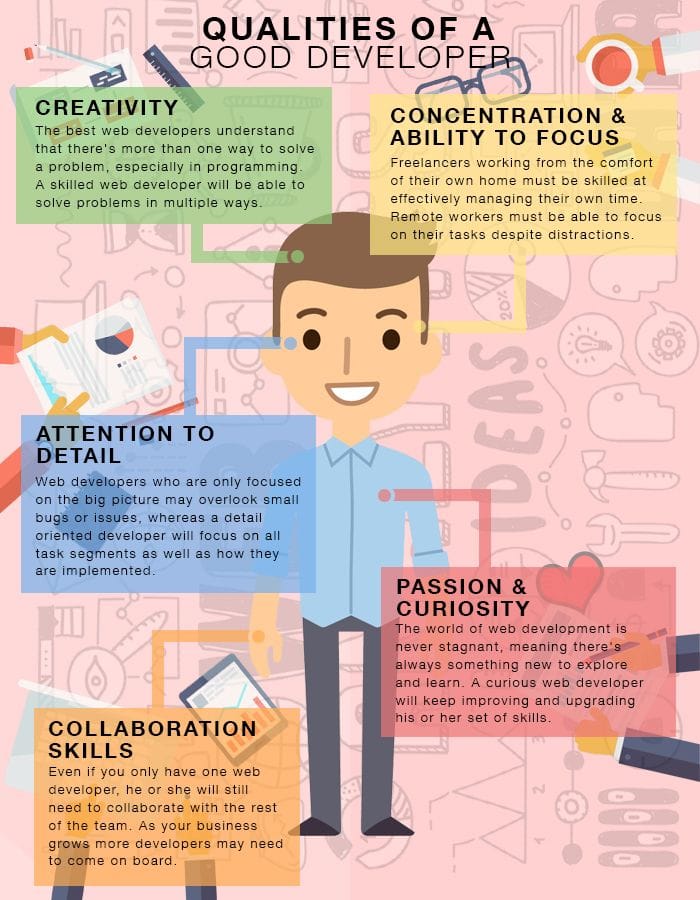
Creativity
The best web developers understand that there’s more than one way to solve a problem, especially in programming.
A skilled web developer will be creative enough to get around, over and under any issues that pop up to ensure a seamlessly functioning website. In addition to being able to find or create solutions, a developer should know what course is best to take for solving a problem.
Attention to detail
Programmers need to pay attention to the details of a project in order to create the best product.
Web developers who are only focused on the big picture may overlook small bugs or issues, whereas a detail-oriented developer will focus on all task segments as well as how they are implemented. This will have a positive influence on the overall user experience.
Collaboration skills
Even if you’re looking to hire just one developer for your business or project, good collaboration skills should be a top priority.
The developer still has to collaborate with you and your other teams (ie. writing, marketing, support). There’s also the hopeful possibility of your project growing and needing more then one web developer to scale, so collaboration will become a vital part of the working process.

Passion and curiosity
People decide to become web developers for a variety of different reasons. However, the one crucial characteristic of a good web developer is curiosity and passion for the chosen field.
The world of web development is never stagnant, meaning there’s always something new to explore and learn. Curious web developers will keep improving and upgrading their set of skills.
Important things to consider when hiring fully remote developers
If you’re looking for fully remote developers who will work on their own schedule and from any location, it’s important to take a few more things into consideration.
A good remote developer will have completely different qualities and characteristics compared to an in-house developer. This is because the realities of working remotely are completely different to working inside a company’s office each day.
Remote work can be lonely, monotonous, and mentally draining. Compare this to working in an office, where employees surround each other, and the leader or executive is there to check in on and motivate employees. Meetings and casual conversations break up the day.

To be able to work successfully and productively, and deliver high-quality work consistently, a good remote developer should have the following characteristics (on top of general developer qualities mentioned):
- They should be self-motivated: Remote development work requires an employee to work for hours on end without people around to motivate and encourage them. Because of this, the hire must be able to complete the work to a high standard, and within the deadline without outside motivation.
- The ability to be self-critical: Without a manager or founder around to directly influence and critique a remote developer’s work, poor remote developers can produce inadequate work. To counter this, your remote developer must be constructively self-critical and be able to ensure that they produce high-quality work every time.
- They should take initiative: Development work, whether done remotely or in-house, requires someone to seek out and address problems. Initiative is an especially important characteristic for a remote developer, as they will need to do so without the constant prompting and encouragement of a manager or team leader.
The best remote developers will have these characteristics in abundance, and will have developed and demonstrated them over a successful career.
Since these are soft and intangible characteristics, that can be hard to identify from a resumé or short interview, there are key questions that can be used to determine whether a candidate is likely to have and make use of these qualities. We will cover these in later parts of this guide.
Web development budget
Estimating a web project budget is always hard, especially since there are plenty of variables that come into consideration, such as speed, quality of code, scope of work, and so on.
In many outsourced projects, a general rule of “choose two: speed, quality, cheap price” is applied. This is true for web development, also.
The main guidelines to follow for budgeting is to understand exactly what you’re getting for a set price, or to ask your developer to give an hours estimate if it’s an hourly rate.
Because of the way development works, most developers won’t be able to give you an accurate hours estimate from the start of the projects. Instead, ask developers at each stage of the project if they think they are on time or will need more hours to finish the job.
Different skills and programming languages will cost different amounts The developer’s location can also influence project cost.
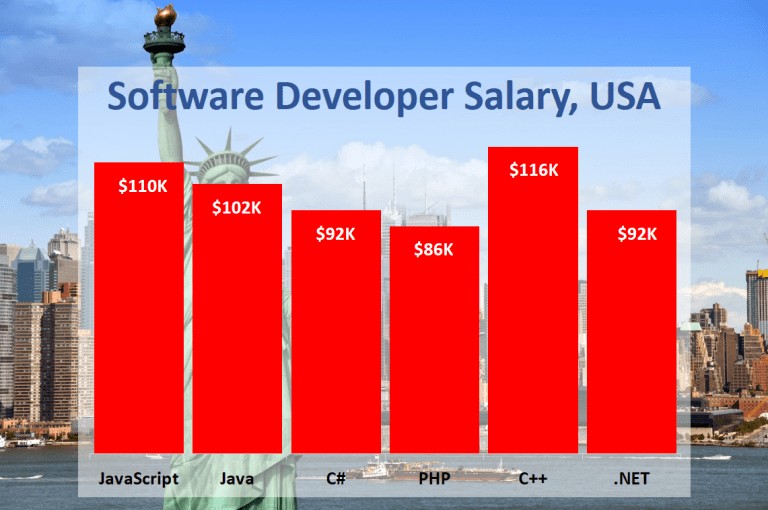
It’s best to go with a set price if you are on a tight budget and don’t want to go over it. Keep in mind that not every developer likes to work this way, but being upfront from the beginning can help.
Where to find skilled web developers
Online freelance marketplaces
These will be great for finding freelancers and contractors that are ready to jump on your projects right away. These sites can be used for both short-term and long-term work.
Hubstaff Talent is a platform that helps connect professional web developers with projects and people who need their services. By collaborating with top contractors from around the world, Hubstaff Talent can help reduce the work of sorting through applications and finding the best fit for your project. And, it’s completely free!t
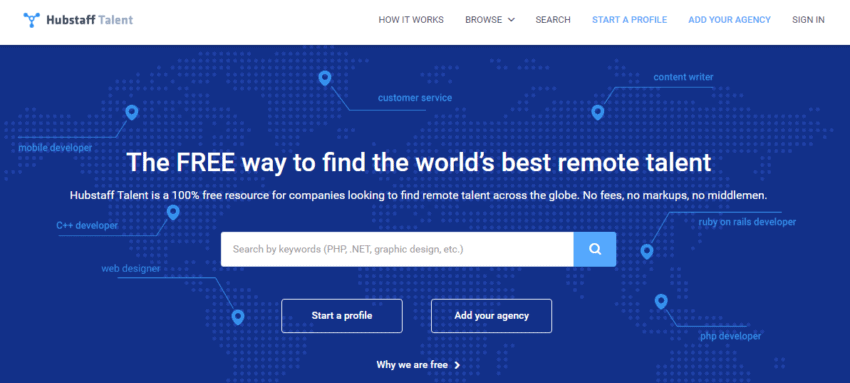
Hubstaff also provides time tracking software that makes it easy to manage your developers and remote workers. Once you find a web developer on Hubstaff Talent, you can have them track time accurately, monitor work and productivity and automate virtual payroll with one app.
Upwork
A project of two Greek entrepreneurs, Upwork was founded in 2003 and 10 years later, reported having almost 3 million freelancers and 540,000 clients all over the world. Upwork charges a 20% fee on the first $500 billed, and then 10% of the total amount earned per project after that. Read more about Upwork’s fees here.
Freelancer
Freelancer was founded in 2009, and has since acquired at least eight freelance marketplaces. This platform has multiple levels of paid memberships and a feature-limited free membership. Like Upwork, Freelancer also charges 10 percent commission fee.
There are many such websites out there. Hubstaff has a great resource on freelance marketplaces.
Remote work job boards and platforms
Outsourcely
Outsourcely differentiates itself by letting employers hire and pay remote workers directly. The talent on Outsourcely is mostly looking for stable long-term remote work, not short-term freelance projects.
This is great for employers who are looking to build sustainable working relationships and dedicated remote teams.
Employers can hire in two different ways: by posting a remote job or by searching Outsourcely’s talent pool by skill and contacting candidates through real-time private chat, video and voice calling, messaging or just regular email. This makes hiring fast and easy.
Remote OK
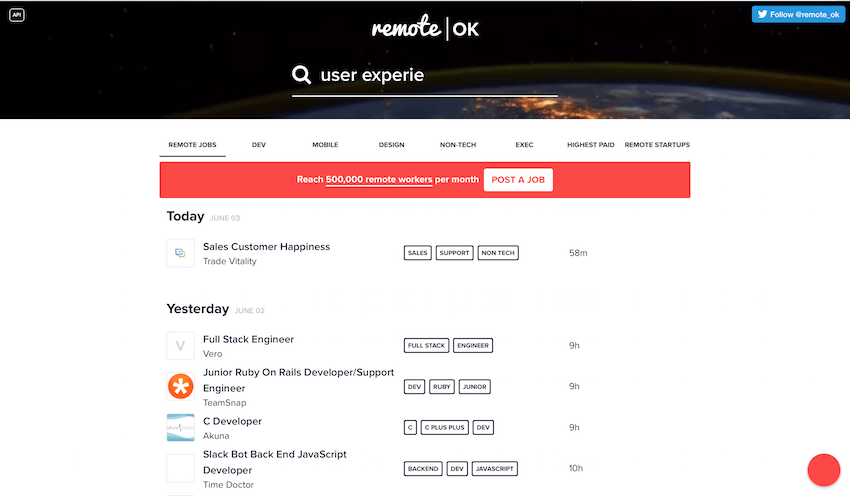
Remote OK is exclusively for virtual positions. It’s free to post a job and jobs can be filtered for web or mobile dev. This site claims to reach more than 100,000 remote workers monthly, and the jobs you post will be promoted on platforms like Nomad List, Nomad Forum, #nomads, and other sites. To add your job, just fill out a quick form with your company information, job title, description, and instructions to apply.
Toptal
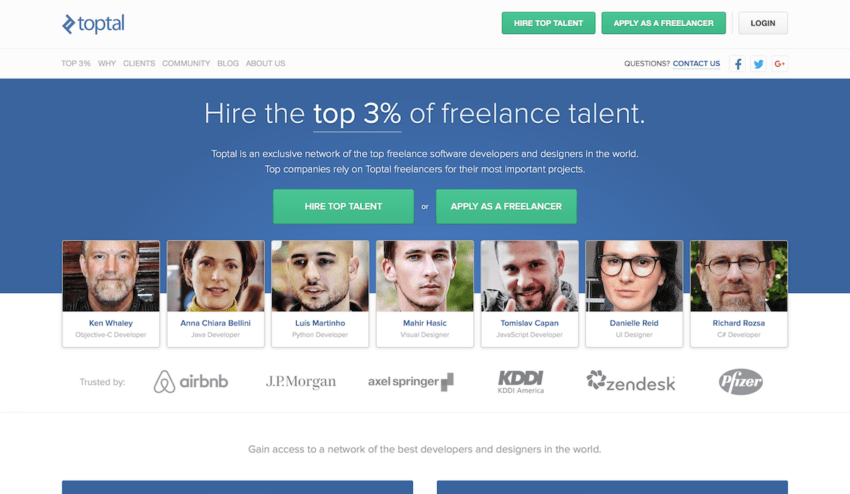
Founded with the specific intention of helping only the best designers and developers find work, Toptal should be high up on your list of places to post jobs. The platform is used as a recruitment tool by companies like AirBnB and J.P. Morgan, and offers a rigorous testing process which creates a high barrier to entry that ensures only the top 3% of designers and developers are able to apply for positions.
We Work Remotely
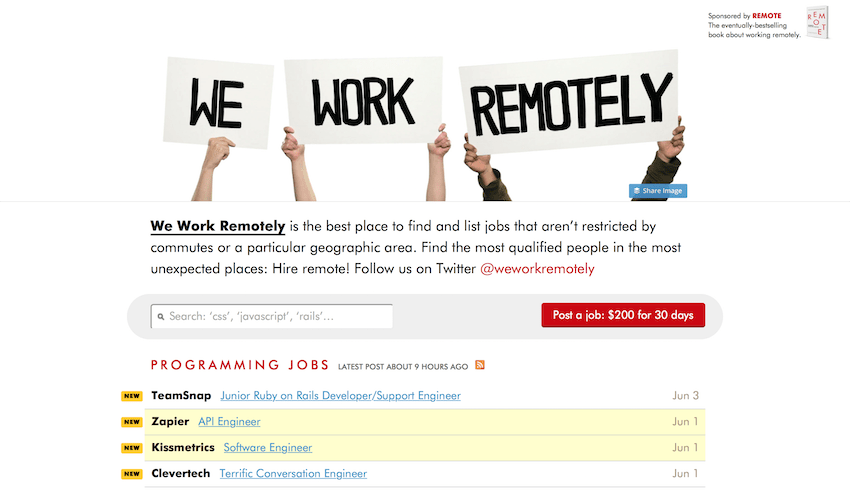
Created by 37Signals, the team behind Basecamp and the best-selling book Remote, We Work Remotely was established specifically to offer remote work positions to talented people across the world. The job board does not have a sophisticated testing system like Toptal, but it does attract great talent. The site typically attracts technical candidates, so it is a perfect choice for someone looking for a remote developer.
Gun.io
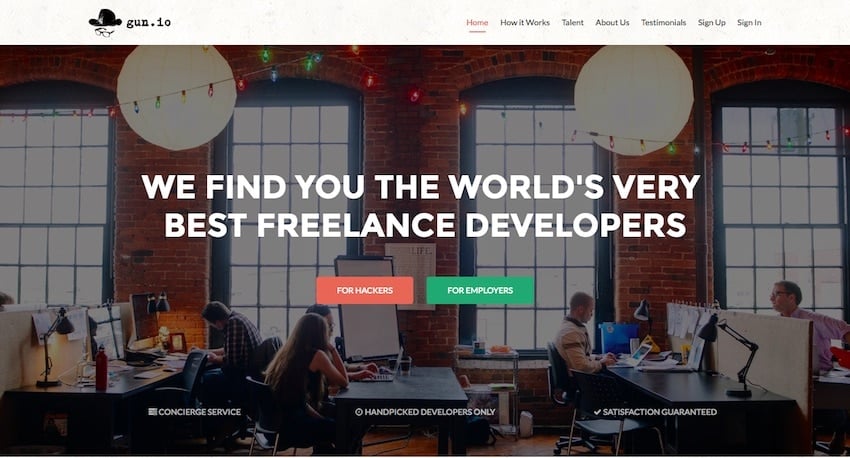
Gun.io is a website that focuses solely on connecting businesses with the best freelance developers. They pride themselves on handpicking only the most skilled and experienced professionals, and offering a concierge service to their customers. The team has already applied its model for companies like Amazon, Zappos, and Lonely Planet.
FlexJobs
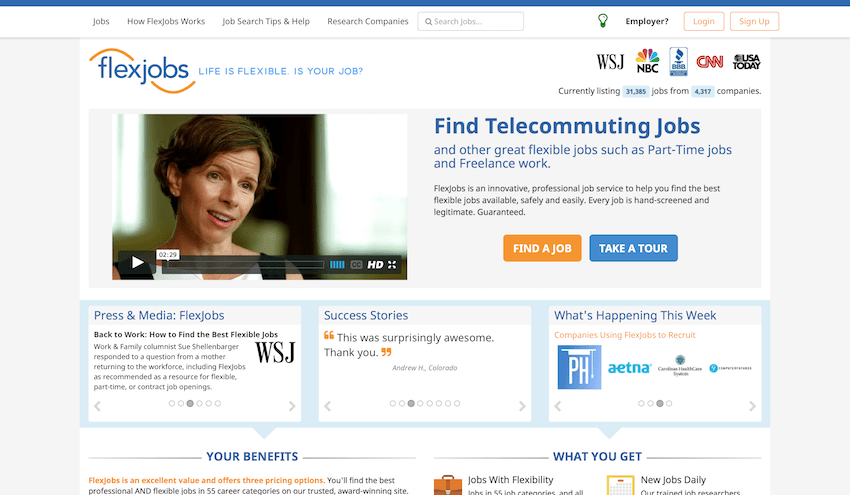
Used by companies like Apple, Uber, Hilton, and Amazon, FlexJobs is a large job site (there are currently over 30,000 vacancies) that caters specifically to remote and flexible job opportunities. Posting here will place your job vacancy in front of thousands of talented developers specifically looking for remote work opportunities. Unlike Toptal though, FlexJobs does not have a barrier to entry, so you may receive some applications from under qualified applicants.
Working Nomads
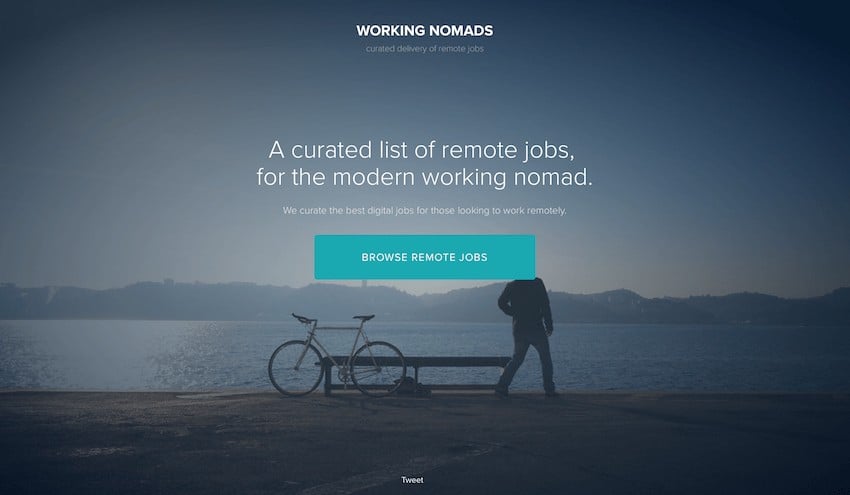
Curating the best remote work positions from around the internet, Working Nomads is a tech-focused remote work jobs board that should also be considered as part of your recruitment plan. Typically visited by those looking for remote work positions in technology and development, Working Nomads is a perfect place to attract quality remote developers.
Hired
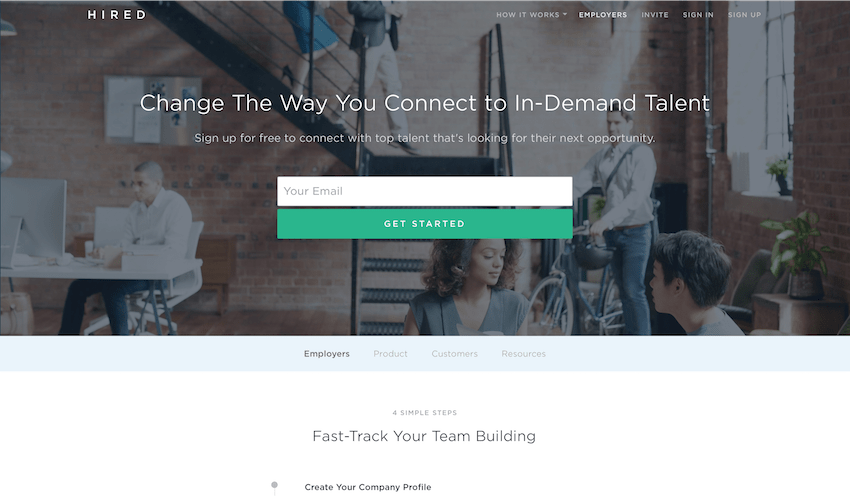
This rising Silicon Valley startup’s hiring marketplace works unlike traditional jobs boards in that companies approach talented people, not the other way around. This means that you can actively seek out the right remote developer for your position and make sure that you get candidates with the qualifications, experience, and expertise that you need. Hired is a more expensive option than other platforms, which charge only for job listings, they currently take up to 2% of a candidate’s monthly salary for 24 months. This option is only viable if you are willing to pay this fee.
Consider these sites to reach remote and in-house developers
AngelList
AngelList is a great place for startups and talented web developers to connect. As a business, you just need to create a startup profile to showcase your product and team, post a job and clarify the positions, then match with top candidates and reach out when there’s mutual interest. There are currently more than 13,000 startups looking for talent on AngelList.
LinkedIn is a professional networking site that allows professionals to maintain their connections, showcase their work history and collect recommendations. In fact, Hubstaff found its technical co-founder thanks to LinkedIn. This is a great site to reach out to potential web developers with impressive resumes and portfolios. Its strength lies in your ability to leverage your network, with options to get introduced by a mutual connection or discover profiles based on the developers you’re already looking at.
Authentic Jobs
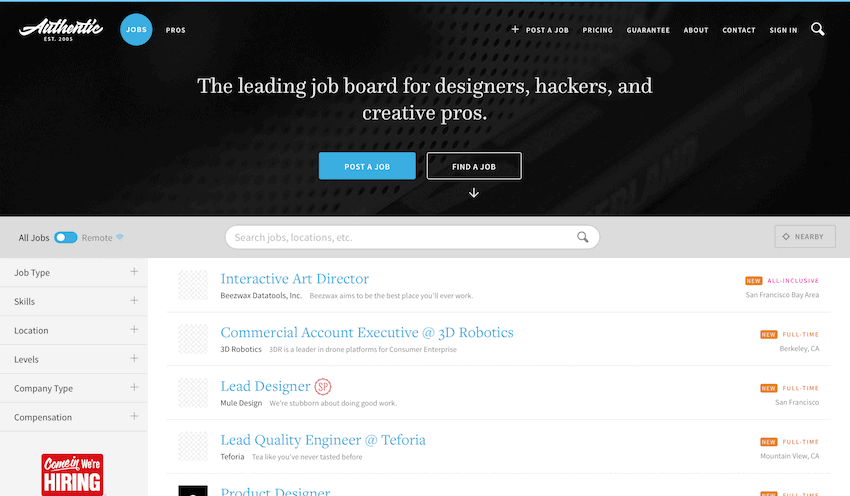
In addition to the job listing site of Authentic Jobs, recruiters can also look at Authentic Pros for a directory of almost 2,000 hackers, designers, and creative professionals. When you post a job with Authentic Jobs, they also advertise it across their social media and partner sites, including Indeed. Authentic Jobs has filters based on what you’re looking for, such as full-time, part-time, freelance or even remote positions.
HackerNews Who is Hiring
HackerNews is a community of startup professionals founded by Y Combinator. The audience and users of HackerNews are typically talented marketing, design, and web development pros. Recruiters can look at profiles to see how someone has contributed to the community. You can post your jobs on a Who is Hiring monthly thread. Just select the current date and post your job and contact details as a comment.
Bonus: Alternative methods for finding quality developers
If you’re still struggling to find a good web developer, there are other ways of discovering top developers that don’t rely on jobs boards or platforms.
- Google searches can be a great way to find top talent. Using a variety of search queries, specific to your needs, you can find the developers with the highest ranking websites, who have had articles written about them, or who have been credited with working on other challenging projects.Occasionally, you will find posts that roundup the top developers in any given sector, such as “T‘he best freelance WordPress developers’.” These posts can be incredibly helpful, and can give you a much-needed second opinion that you can use in your hiring process.
- Tech recruiters can also be a great way to discover top talent. While taking this route is usually more expensive, it can lead to great results and may help to save you time in the long run. If you have a preference for where your candidate lives (for example you’re looking for a developer who lives in Manila), you can search for the top tech recruiters in this area and then call on them to find you top talent.
- Social Media is an often overlooked way to discover candidates, as people tend to look at services like Twitter and Facebook as places solely for personal conversations. If you have a good-sized social following, try sharing posts that let your followers know you are looking to hire a remote developer, and call on your followers to either recommend themselves or someone they know.
Top tips for posting a job
The right type of job description will attract the highest quality applicants. Similarly, postings that lack information are the ones that attract low-quality applications, so make sure yours is well filled-out, with all the relevant details.

Cover all of the bases and try to think like a job hunter. That means including all of the relevant details like salary, your company’s website, a summary of the type of work they will be doing, and details of any benefits or equity your hire will receive.
You can learn how to write a great developer job description here.
How to choose the right candidate
Check the candidates before you interview them
The next step in learning how to hire the best web developers is to master the selection process.
Conducting a successful interview will give you the edge you need to identify the best person to work with among all the candidates. There are multiple steps to this, such as setting up a good interview process and asking the right questions.
Implement a structure for filtering the applicants
If you’re looking for a fully remote developer, your talent pool will naturally be very big, considering all the developers looking for work across the world. If you’re looking for a local developer and post it in the right places, you’ll likely get a good response.
This means you can expect a flow of applicants and submissions. Your goal at this stage will be to apply the same criteria for each applicant, instead of being biased and rushing through the submissions or missing some applicants altogether due to errors.
What has worked for us at Hubstaff when hiring developers is using a Trello board for all applicants and automating some of the process by Zapier.
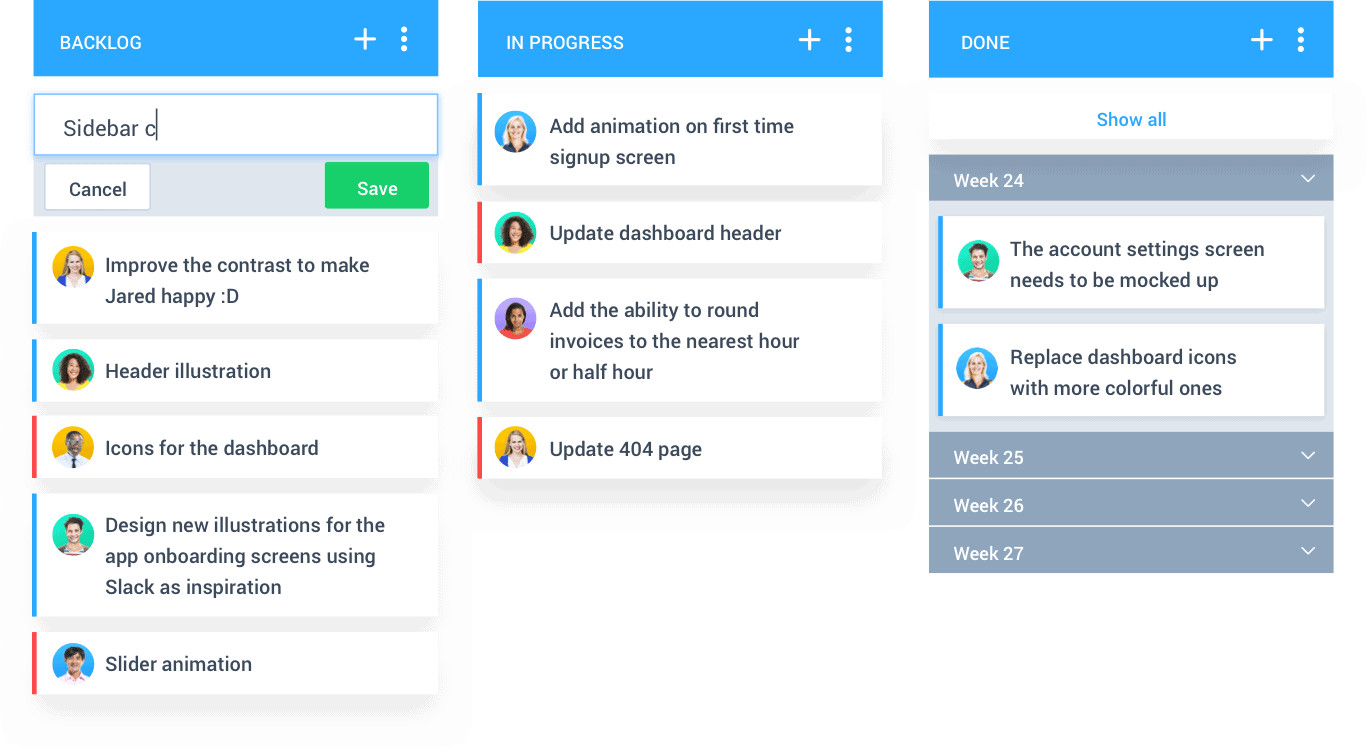
Each application becomes a card that you can move around in the columns and also discuss internally within your team in the comments. Any new applications gets automatically added to the list by Zapier — so you never miss anyone and everyone goes through the same process.
This really is a crucial step. Filtering and processing is so important that it’s almost impossible to get a good developer without having a good system in place.
Implementing a rigid system of managing your applications means that you never lose track of what’s happening with the recruitment process. You can ensure that each candidate has gone through the same process, and that only the best applicants get moved into the interview stage.
While we have used Trello in the past for this, you can use any Kanban board, such as Hubstaff Tasks. If you’re a fan of Trello, be sure to check out our guide on Kanban boards including how you can use them in Hubstaff Tasks for streamlined project management.
Check the candidates before you interview them
After you have found and shortlisted potential candidates, take some time to vet your potential hires carefully before you schedule an interview.
Time spent doing this before you chat with them will save you time and money in the long term.
At this step, you’re basically looking at any signs that this developer might be unreliable and otherwise any negative reviews about the developer. Just keep in mind that a bad review does not automatically mean you will have a bad experience with a certain person, but any comments about unreliability need to be taken very seriously.
You should be able to find the applicants profiles across different social media and freelance marketplaces, to get a sense as to what other people say about this person.
Once you have gone through and researched each candidate in more detail, invite those who passed for a video interview.
How to interview a developer for a position
The interview stage is an incredibly important part of the process, as it is where you can truly discover which candidates are perfect for your company: both in terms of technical and professional ability, and in personal culture fit.

During the interview, pay attention to the following details in order to maximize your chances to discover your next star employee:
- Portfolio – Discuss some of the most interesting projects your web developer candidates listed on their portfolio. Ask questions about how they built it, why they created certain features, etc. If developers are struggling to find the answers, it could mean they were only in a support role on the project.
- Recommendations – Look through the recommendations provided and talk about some of the previous work experience they have had. Try to get a feel of the relationship between web developers and the person recommending them.
- Honesty – Ask questions to determine the honesty of your web developer. Do their answers line up and make sense with each other? Does what they say fit with their recommendations and experience? You can also ask questions to see how honest a web developer is willing to be with you, such as, “What do you find tedious about web development?”
- Interview questions for developers – Of course, you have to make sure the candidate has the technical knowledge for the job. A few good developer interview questions can be the key to finding the right developer.
- Questions for you – Well-prepared candidates will know enough about your company and the business that they should have at least some insightful questions for you. Look at the questions they ask to tell whether they were paying attention and did their research.
- Sample tasks – In order to see whether certain web developer candidates fit well with your team and product, give them a paid test task to gauge their skills. You can have your team design these tasks based on what they will need in the future, so no work goes to waste.
Check out our guide on hiring remote employees here.
How to interview a developer if you are non-technical
If you are non-technical, ask questions about previous roles, how well they work in dispersed teams, what their ability to communicate and work with team members is like, as well as how well they understand the intricacies of your business.
Attempt to gauge how well they execute. This includes how rapidly they can make changes, whether they are able to deal with fundamental scope and project changes, and whether they are able to call on existing knowledge to help overcome challenges.
To assess how the developer will work with other non-technical teammates, have the developer explain a previous project’s technology stack and processes to you in easy-to-understand terms. If they are unable to do this or explain things in a way you understand, they might not work well with other teammates who do not have technical skills.
For more guidance, check out this post on hiring as a non-technical person.
Are you ready to hire a great developer?
Hiring a good developer can be really tough. There is a sea of developers out there that can keep you from finding the ideal candidate for your project.
But as long as you follow the process carefully, and make sure that your interview and recruitment processes are methodical and considered, you will find that discovering top talent is easier than you could have imagined.
If at any point in the process, you feel like you aren’t getting anywhere, don’t be afraid to step back, reset, and start again.

Taking extra time to find the right developer for the first time may seem impossible at the beginning, but it will often save you time and money in the long run.
Once you’ve hired your developer, start a 14-day free trial of Hubstaff to monitor them efficiently and effectively, and make sure that they are working productively.
Over to you
Hopefully after reading this, you will know how to hire the best web developers for your business. We are always looking to learn from and help our readers, so if you would like to add anything or ask us a question, please do so in the comments section below.
Share your experience and best practices with hiring programmers, too. We would love to hear about them.
Subscribe to the Hubstaff blog for more posts like this
Most popular
How to Calculate a Raise: Practical Guide for Employers
By 2030, the US alone will lose $430 billion annually due to low talent retention — and a lot of this turnover stems from low pa...
How to Survive and Thrive in an 80-Hour Work Week
It’s hard to believe that only a century ago, the 80-hour work week was the norm in the United States. Then, in 1926, the Ford M...
Mastering Workforce Scheduling: Techniques and Tools for Success
Imagine a workday where scheduling your workforce effectively ensures that every shift is perfectly aligned with your business nee...
Top Time Trackers for Virtual Assistants: Enhance Efficiency and Accountability
Virtual assistants (VAs) have a lot of responsibilities — and so do the people who hire them. With so much to keep track of, a t...




